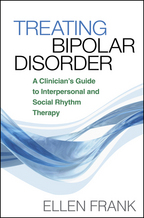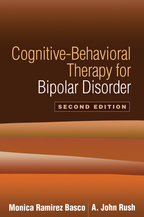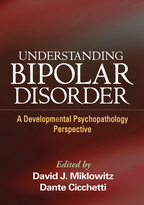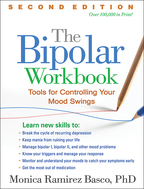Treating Bipolar Disorder
A Clinician's Guide to Interpersonal and Social Rhythm Therapy
Ellen Frank
HardcoverPaperbacke-bookprint + e-book
Hardcover
orderJune 15, 2005
ISBN 9781593852047
Price: $65.00 212 Pages
Size: 7" x 10"
Paperback
orderApril 24, 2007
ISBN 9781593854652
Price: $43.00212 Pages
Size: 7" x 10"
“This book is a welcome and needed contribution for treatment of one of the most challenging mental disorders....Ellen Frank's groundbreaking work in disruption of circadian rhythms now offers all those who work with bipolar illness an evidence-based psychological therapy. It is a strongly recommended read for prescribers and therapists and a must read for graduate students or new graduates beginning practice since case studies are used for illustration of therapeutic concepts.”

—Bulletin of the Menninger Clinic
“The writing throughout the volume is cogent, coherent, and comprehensive....The work is particularly useful for non-psychiatric clinicians who treat individuals with bipolar disorder in collaboration with a psychiatrist. Dr. Frank's systematic approach is recommended to every practicing psychiatrist committed to holistic care of patients with bipolar disorder. The author's passion and commitment to the patient with bipolar disorder and their loved ones are evident throughout this well-conceived model of care.”

—Psychological Medicine
“Valuable to clinicians with varied levels of expertise....Useful for seasoned practitioners who wish to expand their repertoire of treatment skills for bipolar disorder to stabilization of social rhythms.”

—Cognitive Behavioral Therapy Book Reviews
“Ellen Frank's manual is an important contribution to the treatment of bipolar disorder. It clearly articulates the nature of the illness, how best to conceptualize the role of psychotherapy in a condition whose origins and treatments are primarily biological, how to assess the goals of therapy for an individual patient, and the specifics of utilizing IPSRT. This book is a welcome addition to the field.”

—Kay Redfield Jamison, PhD, Department of Psychiatry and Behavioral Sciences, Johns Hopkins School of Medicine
“In easy-to-read prose, Ellen Frank explains interpersonal and social rhythm therapy, a new psychosocial intervention for bipolar disorder. Based on her groundbreaking work on the role of sleep-wake cycle disturbances in the onset of mania, Dr. Frank explains how stabilizing people's daily routines can enhance mood stability and interpersonal functioning. She provides step-by-step methods for addressing interpersonal problems associated with the illness, such that clinicians will be well on their way to using the treatment even with their most severely ill patients. The case studies are highly illustrative of the complexities of treating this debilitating illness. There is much wisdom in this book for clinicians and researchers.”

—David J. Miklowitz, PhD, Department of Psychology, University of Colorado, Boulder
“Using a creative combination of techniques, Dr. Frank provides a structure that will allow clinicians to intervene more helpfully with patients with bipolar disorder. A well-written and scientific description of the illness forms the basis for the provision of clear strategies for coping with it more effectively. Rich case examples demonstrate an empathic understanding of the illness and its devastating impact on patients and families. Clinicians working with this population should find this readable, pragmatic book an essential addition to their professional libraries.”

—Carol M. Anderson, MSW, PhD, Department of Psychiatry, University of Pittsburgh School of Medicine
—Bulletin of the Menninger Clinic
“The writing throughout the volume is cogent, coherent, and comprehensive....The work is particularly useful for non-psychiatric clinicians who treat individuals with bipolar disorder in collaboration with a psychiatrist. Dr. Frank's systematic approach is recommended to every practicing psychiatrist committed to holistic care of patients with bipolar disorder. The author's passion and commitment to the patient with bipolar disorder and their loved ones are evident throughout this well-conceived model of care.”
—Psychological Medicine
“Valuable to clinicians with varied levels of expertise....Useful for seasoned practitioners who wish to expand their repertoire of treatment skills for bipolar disorder to stabilization of social rhythms.”
—Cognitive Behavioral Therapy Book Reviews
“Ellen Frank's manual is an important contribution to the treatment of bipolar disorder. It clearly articulates the nature of the illness, how best to conceptualize the role of psychotherapy in a condition whose origins and treatments are primarily biological, how to assess the goals of therapy for an individual patient, and the specifics of utilizing IPSRT. This book is a welcome addition to the field.”
—Kay Redfield Jamison, PhD, Department of Psychiatry and Behavioral Sciences, Johns Hopkins School of Medicine
“In easy-to-read prose, Ellen Frank explains interpersonal and social rhythm therapy, a new psychosocial intervention for bipolar disorder. Based on her groundbreaking work on the role of sleep-wake cycle disturbances in the onset of mania, Dr. Frank explains how stabilizing people's daily routines can enhance mood stability and interpersonal functioning. She provides step-by-step methods for addressing interpersonal problems associated with the illness, such that clinicians will be well on their way to using the treatment even with their most severely ill patients. The case studies are highly illustrative of the complexities of treating this debilitating illness. There is much wisdom in this book for clinicians and researchers.”
—David J. Miklowitz, PhD, Department of Psychology, University of Colorado, Boulder
“Using a creative combination of techniques, Dr. Frank provides a structure that will allow clinicians to intervene more helpfully with patients with bipolar disorder. A well-written and scientific description of the illness forms the basis for the provision of clear strategies for coping with it more effectively. Rich case examples demonstrate an empathic understanding of the illness and its devastating impact on patients and families. Clinicians working with this population should find this readable, pragmatic book an essential addition to their professional libraries.”
—Carol M. Anderson, MSW, PhD, Department of Psychiatry, University of Pittsburgh School of Medicine













